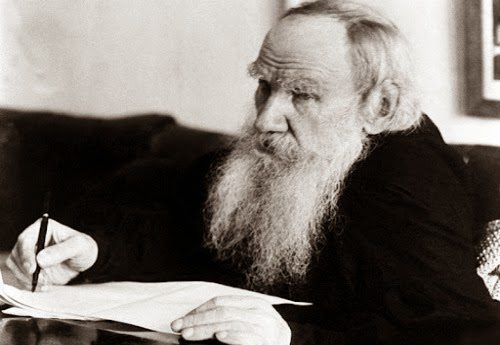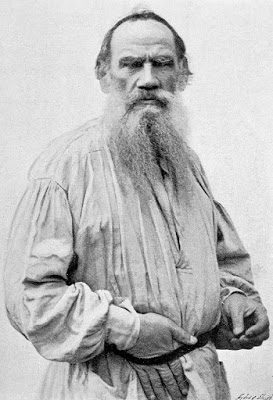Leo Tolstoy’s favourite books from each stage of his life, or “Works which made an impression”

In 1891, a Petersburg publisher (who was undergoing the impressive feat of asking 2,000 influential luminaries for their favourite books) contacted Leo Tolstoy to ask about the books that had influenced him.
Somewhat characteristically considering his love for lists, Tolstoy grouped his recommendations into the five stages of his life that he had covered so far, up to the age of 63. For each stage, books were also categorised as “great”, “v. great”, and “enormous”.
The result is the following, as included in R.F. Christian’s wonderful collection of Tolstoy’s Letters: Volume II (he has also published Tolstoy’s diaries in two volumes).
The letter opens with a disclaimer – “I am sending the list I began, but didn’t finish, for your consideration, but not for publication, since it is still far from complete” – and the heading, “WORKS WHICH MADE AN IMPRESSION”.

Leo Tolstoy’s favourite books from each stage of his life
Childhood to the age of 14 or so
“Great”:
Tales from The Thousand and One Nights: the 40 Thieves, Prince Qam-al-Zaman
Pushkin’s poems: Napoleon
“V. great”:
The Little Black Hen by Pogorelsky
“Enormous”:
The story of Joseph from the Bible
Russian byliny folk tales: Dobrynya Nikitich, Ilya Muromets, Alyosha Popovich
Age 14 to 20
“Great”:
Tales of Good and Evil by Nikolai Gogol: Overcoat, The Two Ivans, Nevsky Prospect
The Conquest of Mexico by William Prescott
“V. great”:
A Sentimental Journey by Laurence Sterne
Nouvelle Héloise by Jean-Jacques Rousseau
Yevgeny Onegin by Alexander Pushkin
Die Räuber by Friedrich Schiller
Dead Souls by Nikolai Gogol
A Sportsman’s Sketches by Ivan Turgenev
Polinka Sachs by Aleksandr Druzhinin
The Hapless Anton by Dmitry Grigorovich
A Hero for our Time by Mikhail Lermontov
“Enormous”:
Matthew’s Gospel: Sermon on the Mount
Confessions by Jean-Jacques Rousseau
Emile by Jean-Jacques Rousseau
“Viy” from “The Collected Tales of Nikolai Gogol”
David Copperfield by Charles Dickens
Age 20 to 35
“Great”:
Poems by F.T. Tyutchev
Poems by Koltsov
The Odyssey and The Iliad by Homer (read in Russian)
Poems Afanasy Fet
Phaedo and Symposium by Plato (read by Tolstoy in Cousin’s translation)
“V. great”:
Hermann and Dorothea by Johann Wolfgang von Goethe
Notre Dame de Paris by Victor Hugo
Age 35 to 50
“Great”:
Novels of Mrs. [Henry] Wood
Novels of George Eliot
Novels of Anthony Trollope
“V. great”:
The Odyssey and The Iliad (in Greek)
The byliny
Xenophon’s Anabasis
“Enormous”:
Les Misérables by Victor Hugo
Age 50 to 63
“Great”:
Discourse on religious subject by Theodore Parker
[Frederick William] Robertson’s sermons
“The Essence of Christianity” by Ludwig Feuerbach
“V. great”:Book of Genesis (in Hebrew)
Progress and Poverty by Henry George
Confucius and Mencius
“Enormous”:
All the Gospels in Greek
Pensées by Blaise Pascal
Epictetus
“Lalita Vistara” by Rajendralala Mitra
Lao-Tzu [Tolstoy read the French translation of S. Julien]
If you enjoyed this preview of Tolstoy’s skill for lists, you might also appreciate his Calendar of Wisdom, the collection of quotations that he believed to be his most important contribution to humanity. There are also his amusing “Rules of life as part of his self-improvement project, including “Visit a brothel only twice a month”.
Enjoy more from me
- Retreat into my new book, Your Life in Bloom: Finding Your Path and Your Courage, Grounded in the Wisdom of Nature.
- I'm also the author of Mountain Song: A Journey to Finding Quiet in the Swiss Alps, a book about my time living alone by the mountains.
- If you love books, are feeling a little lost right now, and would love some gentle comfort and guidance, join The Sanctuary, my seven-day course to rebalance your life.
